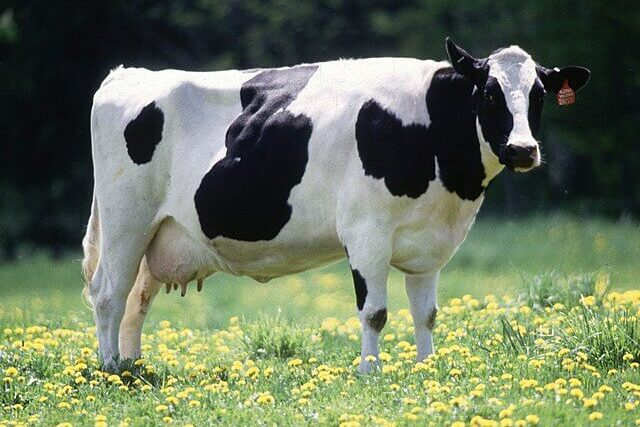
The UK government is planning to “encourage” the use of methane suppressants for dairy cows in order to reduce greenhouse gas emissions from farming. The suppressants, which can be made from chemicals or natural ingredients such as seaweed, inhibit or disrupt the enzymes that produce methane during digestion and release.
Cows produce methane through digestion, mostly through “silent burping” and farting, and the world’s 1.5 billion cattle each produce up to 500 litres of methane a day. Scientists estimate that cattle are significant contributors to climate change, as methane has more than 80 times the warming power of carbon dioxide during its first 20 years in the atmosphere. Methane makes up more than half of all greenhouse gases produced in agriculture in the UK, according to a 2019 study.
The UK government believes that methane suppressants, which are expected to enter the UK market in 2025, could help the country meet its target of achieving net zero by 2050. A government spokesperson said, “Well-managed livestock can provide various environmental benefits, and we plan to encourage the uptake of high efficacy methane suppressing products once they reach the UK market.”
Tom Bradshaw, deputy president of the National Farmers’ Union, called the development of methane-suppressing products “exciting” for the industry. He said, “Everybody recognises the need to reduce climatic impact, and this is something we are really interested in. This could be a really positive step for that.” However, Mr Bradshaw added that there was some suggestion that some suppressants could reduce the effectiveness of feeds, and more research was still needed.
Farmers will also face the additional cost of buying the suppressants at a time when many are facing higher feed and fertiliser costs. Mr Bradshaw suggested that rewards and incentives from the government for producers who reduce their emissions could help offset this cost.
Cows and other hooved livestock, such as sheep and goats, produce methane while digesting grass and organic-based feeds. Around 70% of all methane emissions from livestock come from this process, with the remaining 30% arising from the storage and application of manure.
Methane-suppressing products can reduce the amount of methane produced from digestion by inhibiting or disrupting the enzymes which produce the gas. The suppressants can come from chemicals or natural substances, including potentially seaweed and garlic, and can be ground into feed and given to animals.
The UK government’s plan to encourage the use of methane suppressants for dairy cows is not the first aiming to reduce methane emissions from livestock. The government launched a call for evidence in August last year to address the issue.
——————————————————————————
At Natural World Fund, we are passionate about stopping the decline in our wildlife.
The declines in our wildlife is shocking and frightening. Without much more support, many of the animals we know and love will continue in their declines towards extinction.
When you help to restore a patch of degraded land through rewilding to forests, meadows, or wetlands, you have a massive impact on the biodiversity at a local level. You give animals a home and food that they otherwise would not have had, and it has a positive snowball effect for the food chain.
We are convinced that this is much better for the UK than growing lots of fast-growing coniferous trees, solely to remove carbon, that don’t actually help our animals to thrive.
This is why we stand for restoring nature in the UK through responsible rewilding. For us, it is the right thing to do. Let’s do what’s right for nature!
Support our work today at https://naturalworldfund.com/ and join in the solution!

